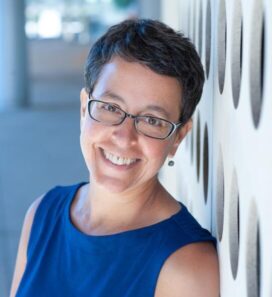Faculty

Rachel Brem, PhD
Adjunct Associate Professor, UC Berkeley
Adjunct Associate Professor of Gerontology
Research
Understanding how and why traits differ between individuals
Overview
Longevity, susceptibility to age-associated diseases, and many other attributes relevant for aging vary from one person to another. These differences are due in part to DNA sequence variants somewhere in our genomes—though exactly where is still a mystery in most cases. Worms, flies, and single-celled microbes can serve as powerful models for the study of the principles of genetic variation. Research in the Brem lab uses these model organisms to discover genetic changes that impact aging behaviors and other traits, as well as their evolutionary histories. The Brem lab approach uses large-scale analyses of thousands of genes at once, both computational and experimental, with ongoing work in the following areas:
The genetics of alternative polyadenylation. Most genes contain instructions for the production of a protein—a molecular machine that does work for the cell—including information that regulates the amount and timing of protein production. The regulatory sequence included at the end of a gene is defined by a process called polyadenylation. Cancer cells have dramatic changes in polyadenylation positions across the genomes, and in a few cases, other human diseases have been associated with naturally occurring genetic variants at gene ends. In general, how polyadenylation differs among genetically distinct individuals is almost completely unknown. The Brem lab is dissecting the genetic basis of naturally occurring variation in gene ends and its impact on protein production. The ultimate goal is to understand sequence signals that drive alternative polyadenylation in individual genes as well as the master regulatory factors that carry out processing at many gene ends in parallel. Current work involves cancer samples and wild single-celled brewers’ yeast.
Natural variation in yeast and fly aging phenotypes. Longevity, and its dependence on diet, can vary dramatically between genetically distinct individuals and between species. In the vast majority of cases, the genetic basis of these differences is uncharacterized. The Brem lab is mapping genes that underlie naturally occurring differences in lifespan in two model organism systems: wild isolates of single-celled yeast cultured in different growth media, and wild-caught Drosophila flies reared on different food sources. The ultimate goal is to identify genes whose role in metabolism and aging is conserved between these simple organisms and humans.
Polygenic evolution. In wild environments, when DNA sequence variants in an organism’s genome confer a fitness advantage, they are maintained and passed to progeny by the process of natural selection. Starvation resistance, fertility, and other traits relevant for aging have been tuned by natural selection during the evolution of many species, likely including humans. How do we discover precisely which genetic changes have enabled adaptive benefits during evolutionary history? Standard approaches examine the DNA sequence of one gene at a time for signatures of natural selection. But a suite of independent genetic variants, at genes all over the genome, may together underlie an advantageous trait. The Brem lab has developed methods to harness groups of genes, rather than just one gene at a time, to detect this type of polygenic natural selection. These strategies use measurements of gene regulation across species as well as DNA sequences from individuals in populations. The project’s current focus is on organism-level advantages to brewers’ yeast that result from polygenic suites of genetic variants, including metabolism and stress resistance.
Rachel Brem, PhD, conducted her thesis work in the lab of Ken Dill at the University of California, San Francisco, where she developed computational methods to model the forces that drive protein molecules to assemble. As a postdoctoral fellow in the lab of Leonid Kruglyak at the Fred Hutchinson Cancer Research Center in Seattle, she pioneered large-scale experimental strategies to discover variants that underlie differences in gene regulation between genetically distinct individuals, using single-celled yeast as a model. She began her independent research career as an assistant professor at the University of California, Berkeley before joining the Buck Institute in 2014. She was a recipient of the Burroughs-Wellcome Career Award at the Scientific Interface and the Ellison Medical Foundation New Scholar Award in Aging.
Email: rbrem@berkeley.edu
Office Phone: 415-209-2093

